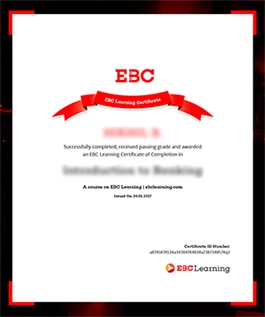Contract Law Essentials: Mod 8 — Negotiable Instruments
A negotiable instrument is transferable with a simple procedure requiring just a signature and delivery. This module begins with a short introduction of negotiable instruments and its kinds. We then walk you through what are promissory notes, bills of exchange and cheques. The subsequent chapters of this module will give you an in-depth understanding of the difference between negotiation and assignment, endorsement, ambiguous and inchoate instruments, holder and holder-in-due-course and the consequences of a negotiable instrument being dishonoured. The two important terms—'noting' and 'protest' are discussed in detail in the last part of this module.
This module includes 42 videos and all relevant sections. It also includes practice exercises, examination pointers, mind maps and flashcards along with the full text of cases.


A negotiable bill or note is a courier without luggage.”
John B. Gibson- 1. Introduction
- I. Relevant sections
- 1.1 Introduction
- 2. What is a negotiable instrument?
- I. Relevant sections
- 2.1 What is a negotiable instrument?
- 2.2 Characteristics of a negotiable instrument
- 2.3 Presumptions as to negotiable instrument
- 2.4 Kinds of negotiable instruments
- II. Exercises
- III. Examination pointers
- 3. Promissory note
- I. Relevant sections
- 3.1 Promissory note
- 3.2 Characteristics of promissory note
- II. Exercises
- III. Examination pointers
- IV. Full text of leading cases
- 4. Bill of exchange
- I. Relevant sections
- 4.1 Bill of exchange
- 4.2 Characteristics of bill of exchange
- 4.3 Classification of bills
- 4.4 Bills in sets
- 4.5 Difference between bill of exchange and promissory note
- II. Exercises
- III. Examination pointers
- IV. Full text of leading cases
- 5. Cheque
- I. Relevant sections
- 5.1 What is a cheque?
- 5.2 Essentials of cheque
- 5.3 Types of cheques
- 5.4 Crossing of cheque—Reasons
- 5.5 Types of crossings
- 5.6 Truncated cheque
- 5.7 Difference between cheque and bill of exchange
- II. Exercises
- III. Examination pointers
- 6. Negotiation and assignment
- I. Relevant sections
- 6.1 Negotiation
- 6.2 Assignment
- 6.3 Difference between negotiation and assignment
- II. Exercises
- III. Examination pointers
- 7. Indorsement
- I. Relevant sections
- 7.1 Indorsement or endorsement
- 7.2 Essentials of a valid endorsement
- 7.3 Effects of endorsement
- 7.4 Types of endorsement
- 7.5 Cancellation of endorsement
- II. Exercises
- III. Examination pointers
- 8. Ambiguous and inchoate instruments
- I. Relevant sections
- 8.1 Ambiguous instrument
- 8.2 Inchoate stamped instruments
- II. Exercises
- III. Examination pointers
- 9. Holder and holder in due course
- I. Relevant sections
- 9.1 Holder
- 9.2 Rights of a holder
- 9.3 Holder in due course
- 9.4 Privileges of holder in due course
- II. Exercises
- III. Examination pointers
- 10. Dishonour of negotiable instrument
- I. Relevant sections
- 10.1 Dishonour of negotiable instrument
- 10.2 Dishonour by non-acceptance
- 10.3 Dishonour by non-payment
- 10.4 Notice of dishonour
- 10.5 Mode and place of notice
- II. Exercises
- III. Examination pointers
- 11. Noting and protest
- I. Relevant sections
- 11.1 Noting and protesting generally
- 11.2 Noting
- 11.3 Protest
- II. Exercises
- III. Examination pointers
- 12. Road ahead
- 12.1 Road ahead
- I. INDEX (FULL TEXT OF CASES)
- INDEX: Full text of cases
This module is a self-paced course on understanding the concept of negotiable instruments. The high-quality content with interactive slides throughout the course ensures engaging and easy learning. The supplementary section of the module contains the full text of cases to facilitate your learning with deeper understanding of all the issues involved in each case. At the end of the module, you will be empowered with all the conceptual clarity of this highly technical Act. The discussion forum will help you post your queries and doubts. This course will not only benefit law students but also the lawyers, bankers and aspirants for the judicial service examination.
Instructors


Dr Charu Mathur
Charu Mathur has a rich and diverse expertise in corporate, commercial, civil, criminal and constitutional law matters. She is an Advocate on Record, Supreme Court of India. She has represented parties which include cricketing bodies and educational institutions like IIT Jodhpur, NLU Jodhpur, BPUT Orissa, MPUAT Rajasthan, private engineering and medicine colleges of Gujarat and Orissa.


The front of a cheque alone gives someone enough information to steal your identity.
Frank W. AbagnaleCertificate
Complete this course and exercises to earn a certificate. Share it with your friends, colleagues, and employers.*
*You must Subscribe to get a certificate.

Limit Reached or Trial Expired
You have reached the limit of 2 audit enrollments or your trial period has expired.

